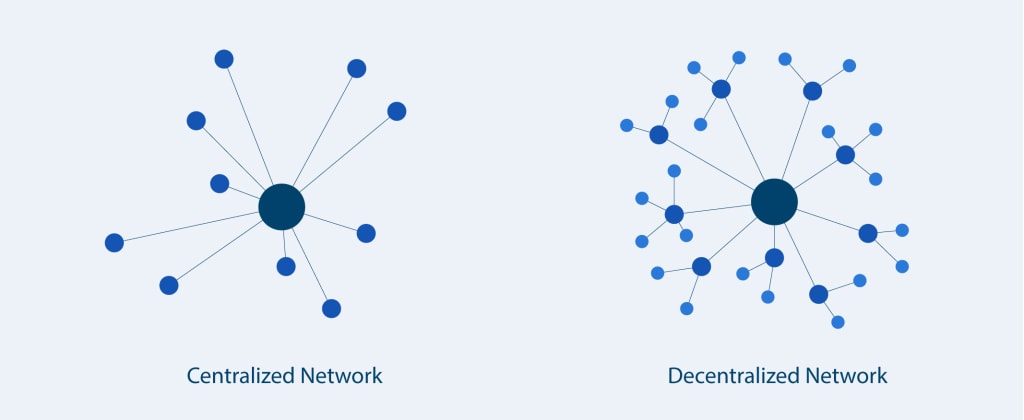
Cryptocurrency trading has grown in popularity in recent years, with the asset class reaching a market capitalization of $2 trillion. Because most digital currencies like Bitcoin and Ethereum proudly decentralize themselves, their ecosystems are merely trading.
Today, centralized exchanges handle the vast majority of bitcoin trading. These networks usually employ intermediaries, third parties, and authorities, which in all decentralized cryptocurrencies are deliberately absent.
But just for a short time! Decentralized exchanges envision a world without single, monolithic institutions approving or disapproving your trading privileges.
How does a decentralized exchange work?
Smart contracts are used at the foundation of decentralized exchanges to ensure that two parties involved in a trade satisfy the terms of their agreement.
A smart contract is a digital, blockchain-based contract that automatically validates and executes an agreement, as the name implies. A smart contract is generally used in the context of a decentralized exchange to store traders' funds in a temporary escrow to verify that they both uphold the terms of the trade.
Smart contracts are ideal for jobs that are prone to criminal conduct or fraud because they do not require any human participation. Decentralized exchanges can operate without the use of intermediaries thanks to smart contracts.
Decentralized exchanges have virtually no downtime since smart contracts are hosted on a cryptocurrency network. Each trade's data is likewise permanently stored on the blockchain, ensuring complete transparency.
Now that you have a basic understanding of decentralized exchanges, let's look at how they differ from (and outperform) centralized exchanges.
Fund Management
The main distinguishing feature is that the former doesn't hold your assets, whether they are fiat or crypto. "Non-garden trade" is thus a term that is often used to describe decentralized trade.
This is significant since the great majority of exchanges need you to deposit your assets with them before you may trade. In other words, you're putting your faith in the exchange to protect your assets and uphold the conditions of trade.
User assets are an easy target for an attacker if a centralized exchange experiences a security breach. It's also not unprecedented to hack an exchange.
Hacks on Centralized Crypto Exchanges
Over the last few years, many exchanges have been the victims of significant cyberattacks and breaches. Because bitcoin transactions are irreversible, an exchange can only do so much to recover monies that have been lost or stolen.
In 2014, the world's largest bitcoin exchange, Mt. Gox has been hacked. At the time, the exchange was the largest intermediary in the cryptocurrency business, accounting for 70% of all global Bitcoin trades.
The exchange filed for bankruptcy in March 2014, claiming that it had become insolvent after hackers gained access to its accounts and stole $460 million in cryptocurrency.
Since then, central exchanges, Bitcoin, and other digital currencies have been robbed of billions of dollars. Almost all major exchanges have lost millions of dollars in digital currencies, from Tokyo's Coincheck to Singapore's Kucoin.
Using a decentralised exchange, you can keep control of your cryptocurrency
Decentralized exchanges, on the other hand, do not demand that you hand over ownership of your cryptocurrency. That means that until the transaction is over, you can keep your crypt-currency in a private wallet.
Decentralized exchanges provide transparency and accountability in addition to the previously mentioned security benefits.
While most centralised exchanges have proprietary trading and order matching systems, most decentralised exchanges do not. One of the most popular decentralised exchanges, Sushiswap price.
Fees of Decentralized Exchanges
Companies such as Coinbase and Kraken are structured as for-profit entities.
They do so by levying fees at nearly every stage of the trading process, including fiat payments, cryptocurrency withdrawals, and setting buy/sell orders. Although these costs are uninteresting to informal investors, they might soon add up to a 1% loss in profits for frequent trading.
Trading fees on decentralized exchanges, on the other hand, are kept as low as possible. 1inch is the best example.
Privacy of a Decentralized Exchange
Centralized exchanges, like every other financial institution, are in legal compliance with local rules and regulations. Therefore, most exchanges require you to subscribe to an account by providing personal and tax documents.
You must obtain this information in the Customer's and Anti-Money Laundering Regulations (AML).
Fortunately, decentralised exchanges are exempt from KYC/AML regulations. Anyone with an internet connection, anywhere in the world, can access and use a DEX. Governments have no way of forcing decentralised exchanges to adopt user identification requirements because there is no central authority or corporation.
Drawbacks of Decentralized Exchanges
In comparison to standard exchanges, decentralised exchanges provide an unprecedented level of freedom and flexibility.
A few variables, however, may limit their acceptance and appeal to a broad spectrum of users. The lack of liquidity on most major DEX platforms is one of them.
Because all trades are peer-to-peer, an exchange may simply not have enough users willing to trade your preferred asset or at the price you desire. Since the owner of the bursary pays for liquidity, in the context of centralized platforms this is not often a problem.
In the eyes of some traders, slow deal settlement times could be a major drawback for decentralized exchanges. Because trades are peer-to-peer, they can take several minutes to complete and display on a blockchain.
Decentralized cryptocurrency exchanges will be the way of the future.
Advances in cryptocurrency and Decentralized Finance will, however, likely over time address these issues. Until then, DEX systems can provide significant privacy and security benefits while trading cryptocurrencies.
About the Creator
Elena
I am crypto girl #Bitcoin #Crypto Enthusiast and Trader| Crypto Promoter | Grow your business with my tips.






Comments
There are no comments for this story
Be the first to respond and start the conversation.